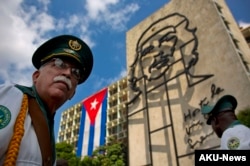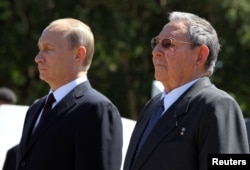Omar Hernandez didn't have a role in building socialist Cuba. He was born in 1963, four years after the Cuban Revolution, and his parents had been supporters of ousted dictator Fulgencio Batista.
But growing up in a small town on the island, Hernandez did soak up Russian influences: an avalanche of Russian literary classics, Soviet films, cartoons and other cultural flotsam the Soviet Union sent to Cuba - all part of Moscow's broader effort to expand communist influence in the Western Hemisphere.
“A Cuban house was a Russian house - the television, the refrigerator, everything in it. It was all Russian,” Hernandez says.
Russians were on the ground in Cuba in those days, remaking the Cuban economy into a version of their centralized system and building factories and power plants.
Military hardware, too, was a big part of the cargo that Soviet ships unloaded in Cuba, along with policies that brought the world to the brink of nuclear war in 1962, when the deployment in Cuba of Soviet nuclear weapons aimed at the United States triggered the Cuban missile crisis.
The overwhelming Soviet influence on Cuba beginning in the 1960s was a factor in a wave of emigration from the island nation, with many Cubans fleeing political persecution for lives in the United States and Europe.
Cuban émigrés who have still strong memories of life in Castro’s Cuba often recount unhappy details of Russia’s effect on Havana - with grey Soviet concrete buildings and low-quality cars.
But in Moscow, the Soviet-Cuban exchange was portrayed more warmly in state-controlled media, which boasted of the warm friendship blossoming between the two countries’ peoples.
Those crowds that turned out in Havana for U.S. President Barack Obama's visit had nothing on the throngs of Russians who mobbed Red Square hoping to get a glimpse of Fidel Castro on his first visit to the USSR.
Castro's revolutionary comrade Che Guevara also spent time in the Soviet capital, where he founded the Russian-Cuban Friendship society along with the USSR's cosmonaut hero Yuri Gagarin. Guevara, a bearded veteran of the jungle guerrilla campaign that brought Castro to power, was known to take in performances at the Bolshoi Theater near the Kremlin.
The growing Cuban-Russian cultural relationship was featured in Soviet newsreels of the time. A Russian pop hit in 1962, Cuba My Love, featured the singer known as "the Soviet Sinatra" - Muslim Magamaev, a baritone from Soviet Azerbaijan.
Russian independent journalist Konstantin von Eggert says during the 1960s, a time when Premier Nikita Khrushchev began easing some of the restrictions imposed under dictator Josef Stalin, average Russians were fascinated by Cuba and its colorful band of bearded revolutionaries.
“We always viewed it as a place where it was warm, where there was great music and where people were more idealistic than we [were],” he said. “You know, this idea of Che Guevara in his beret, and romantic revolutionaries creating a new just state, a new just world, a new just society [resonated] with the Khrushchev-era idea that socialism is essentially something very good and romantic and great, but was totally disfigured by Stalin.”
Castro's government did not quite match the repression and fear that marked the Soviet Union, but it was the lack of freedom that led Omar Hernandez, by then an aspiring writer and playwright studying Russian theater in Havana, to flee abroad in the early '90s.
He spoke his mind too freely, Hernandez says - the sort of thing that sent several of his friends in Cuba to prison. He went off to seek a new life, first in Spain and then in post-Soviet Russia.
The collapse of the Soviet Union changed the Russian-Cuban relationship dramatically.
Faced with its own economic problems in the 1990s, the Kremlin cut off the subsidy payments it had been making for decades to the Castro government. That caused a rift between Moscow and Havana, but Russian President Vladimir Putin says he is now trying to reverse that.
Visiting Cuba in 2014, Putin wrote off the vast majority of Cuba's $32 billion Soviet-era debt to Russia and promised a new era of cooperation.
Despite Putin's gesture, the director of the Latin American Studies at the Russian Academy of Sciences in Moscow, Vladimir Davydov, tells VOA there is "lasting inertia" from Russia's withdrawal from Cuba. That trend has been further complicated by Russia's current economic woes caused by low world oil prices.
"It's no secret that our Russian economy isn't in the best position right now," says Davydov. "Russian trade and exports to Latin America and Cuba have suffered as well." Davydov argues an increasingly open Cuba means increased competition for Cuban business, and he contends that Russian companies can meet that challenge.
Officially, the Kremlin welcomed Obama's visit to Havana, and his call for the United States and Cuba "to bury the last remnant of the Cold War in the Americas.”
A presidential spokesman in Moscow, Dmitri Peskov, says Russia's decades of "friendly partnership with Cuba ... is now taking on a new character."
"We're interested in our Cuban friends having good relations with all their neighbors – including the USA," Putin's spokesman says.
Peskov noted that calls for the U.S. Congress to end the economic embargo it has used against Cuba for a half century amount to Washington's recognition that sanctions - just like those that Russia currently faces for its actions in Ukraine - are a dead-end policy.
There is a growing sense in some parts of Moscow that Russia's special relationship with Cuba may be coming to an end amid the détente between Washington and Havana. If so, journalist Konstantin von Eggert says, it's only natural.
“Cuba in the first place wasn't Russia's to lose. It was chained to Cuba by a quirk of 20th century history,” von Eggert says.














